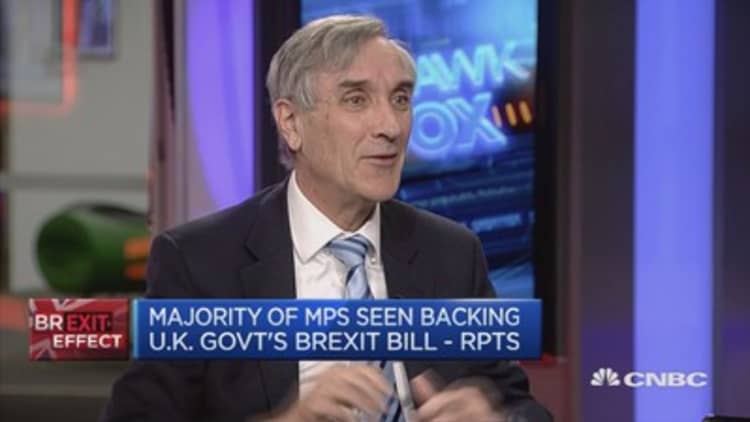British trade won't suffer punitive tariffs, the world will continue to flock to the City of London and there will be no hefty divorce settlement fee to leave the European Union, if the so-called Brexiteers' Brexiteer is to be believed.
John Redwood, chief global strategist at investment manager Charles Stanley and a member parliament for Wokingham, told CNBC Wednesday that "a happy outcome is quite possible" as the U.K.'s negotiations for exiting the EU step up a gear.
Charles Stanley does not hold a house view on the Brexit negotiations but Redwood has made clear that he will be voting in favour a so-called Brexit Bill which is scheduled for later today and will determine Prime Minister Theresa May's ability to begin the EU Brexit process.
Redwood told CNBC that "the worst that can happen to (the U.K.'s) trade is that we will trade with Europe as we trade with the rest of the world at the moment … with relatively light tariffs and relatively light barriers because we've had very good progress through the WTO in getting barriers down between advanced countries, and this is trade between advanced countries."

Indeed, any additional tariffs imposed on the EU outside of the single market would lead to "big profit" for the U.K. government, which it could then rebate to business and people by way of tax cuts, explained Redwood.
As with many of those who campaigned to leave the EU in the lead up to the referendum on June 23, 2016, Redwood remains certain that the City of London, a large contributor to the U.K.'s economy, will not see an exodus of talent and business once departure processes get underway.
Earlier this month, UBS and HSBC announced that they could each move 1000 jobs away from the U.K. as they seek to prepare for disruption caused by negotiations.
Redwood advised banks to have contingency plans in place in case passports, which enable financial firms to carry out business across the EU, are revoked, but said he believes London will remain the world's most competitive financial market.
"Passports are a two-way street and there are many more passports from the Continent into London than the other way around because this is their big capital market. The London markets have lent about $1.5 trillion to the Euro area and they want us to keep lending to them.
A "perfectly amicable solution" can be achieved he said, either by continuing passports, employing the doctrine of equivalence or enabling the U.K. to set its own regulations.
"Many Europeans will want to take advantage, as will the rest of the world," he said.
Redwood also hit back at recent comments from Malta's Prime Minister Joseph Muscat, an EU member, that the U.K. could have to pay as much as 60 billion euros to leave the union.
"I don't see why we should have to pay; I don't see what the legal basis is. You cite to me the treaty article that says you have to pay a lot of money to get out of this club.
"I find it very odd because everybody tells me on the European side that it's this wonderful thing to belong to so surely it's penalty enough, in their terms, that you're no longer in it."


